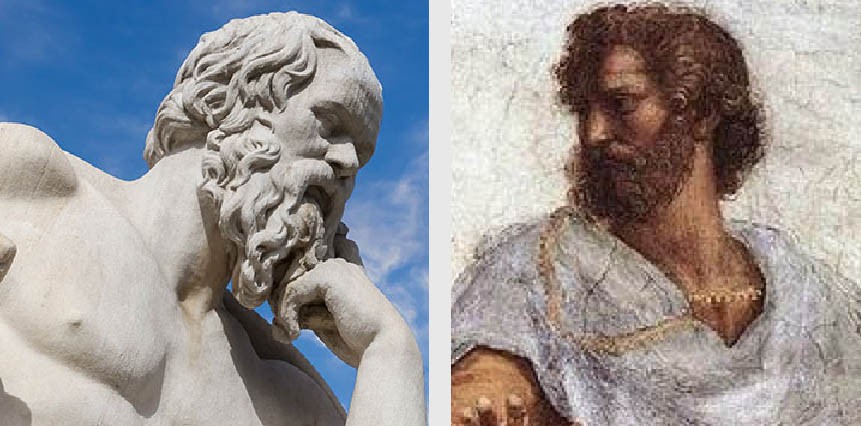

While delving into the conceptual genealogy of democracy, one ends up with ancient Greece as its wellspring. As is well known to the scholars and serious students of politics, demos denotes village in Greek or, as it is invariably translated, deme. The deme was the smallest administrative unit of the Athenian state, like a voting precinct or school district.
Demos had another meaning to the Athenians that was people, the body of citizens collectively. The other part of the word cracy also has its origin in Greek and means rule, government, or governing body. Today the assertion that democracy and philosophy are the two most significant contributions of the ancient Greece to the human civilisation may not appear far-fetched. It is striking, in fact, to learn that one of ancient Greece’s laudable achievements, philosophy, had looked askance at its other achievement, democracy.
Intellectual giants like Socrates and Aristotle considered democracy vulnerable to promotion of demagogues, not conversant with the art of governance. That is exactly what the critics of democracy say in Pakistan. Particularly in the days of dictatorship in Pakistan, that rubric is widely circulated. But let’s get back to the conceptual perspective of democracy from the Greek days.
In the Dialogues of Plato, Socrates is depicted as entertaining a hugely negative view about the whole business of democracy. In book six of The Republic, Plato describes Socrates conversing with a character called Adeimantus and exhorting him about the flaws of democracy by comparing a human society to a ship.
Socrates asks in his usual style, "If you were embarking on a journey by sea, who would you ideally want to oversee the vessel? Just anyone or people well versed in the rules and the art of seafaring?" The latter of course, says Adeimantus, "so why then," responds Socrates, "do we keep thinking that any old person should be fit to judge who should be the ruler of a country?"
Socrates’ point is that "voting in an election is a skill, not a random intuition." And like any skill, it needs systematic instruction. Letting the citizenry vote without proper education is "as irresponsible as putting them in charge of a trireme sailing to Samos in a storm."
He insisted that only those who had thought about issues of the state rationally and profoundly should be entitled to cast vote. Thus, Socrates was not amenable to the idea of a popular democracy which allows everybody to participate in the electoral process. Aristotle thought almost the same. Aristotle on democracy, says philosopher and writer Julian Baggini, is "more relevant than ever".
Accordance to Baggini, "Aristotle’s favoured form of government was the rule by the best over the rest, an aristocracy based on merit rather than blood. He even thought a good monarchy was better than a democracy. Partly at least, Aristotle’s criticisms of democracy were insightful and prescient. They are more relevant in the age of Trump, Modi and Boris Johnson than ever. Aristotle’s main criticism of democracy was ‘that it undermined the rule of law.’ A functioning state requires everything to be governed by laws. Otherwise, checking those exercising power becomes difficult. Consequently, they do what they want and tyrannize the marginalised sections. ‘In a pure democracy, the will of the majority is sovereign, not the law, not the state.’ If the people decide someone should be executed, they are executed and no law against capital punishment can stop that. Now it is important to note that Aristotle considers ‘the will of the people’ as a sort of binary opposite to ‘the rule of law’, which he thinks is the sole preserve of the elite. Probably the class hierarchy had the starkest of its manifestations in ancient Greece that reflected in the thoughts of its seers."
In the modern age, with the Western world having undergone the experiences of Enlightenment and French Revolution, the political thought and practice made several advances and brought forth the synthesis between the ‘will of the people’ and ‘the rule of law.’ Obviously, the Western Europe is its central locus.
England typified the democratic dispensation with the will of the people as its cornerstone, Germany laid down the foundation for a very strong bureaucratic set-up, which saw to it that law is executed in its true letter and spirit. In the 19th century, these two streams converged in England. After undergoing the upheavals of the severest kind, (including the two world wars) major countries from Western Europe embraced the system whereby the will of the people as well as the proper execution of law through efficient bureaucracy became the norm.
The rule of law, understood as rules that are binding even on the most politically powerful actors in each society substituted the system already in existence, which was once defined through the institution of kinship. Last of the principles vital for any democratic system to be affective is democratic accountability through parliament. In this day and age, leaving aside Scandinavian nations, nowhere in the world all three principles on which the democratic system hinges, seem to be operational.
In the Asian states that have seen economic development in the last couple of decades, democratic accountability is conspicuously non-existent. Strong leadership and unilateralism emanating out of that semi-authoritarian set-up is being practised in a ruthless manner. India is a glaring example of a flawed democracy where one faction and one man rule the roost. Do we need a different system for the Asian and African countries is a question worth asking in the circumstances.
That question becomes more relevant with India having gone despotic, if not fascist, with the ascendancy of Messrs Modi, Amit Shah and Yogi Adityanath.
Concluded